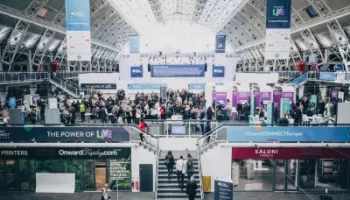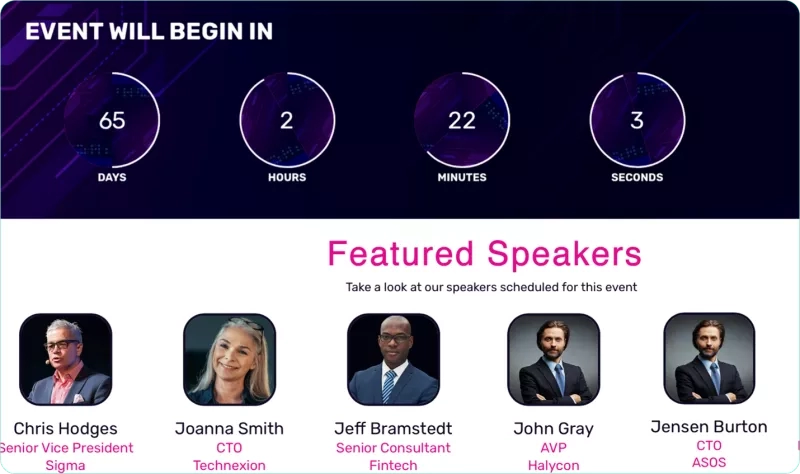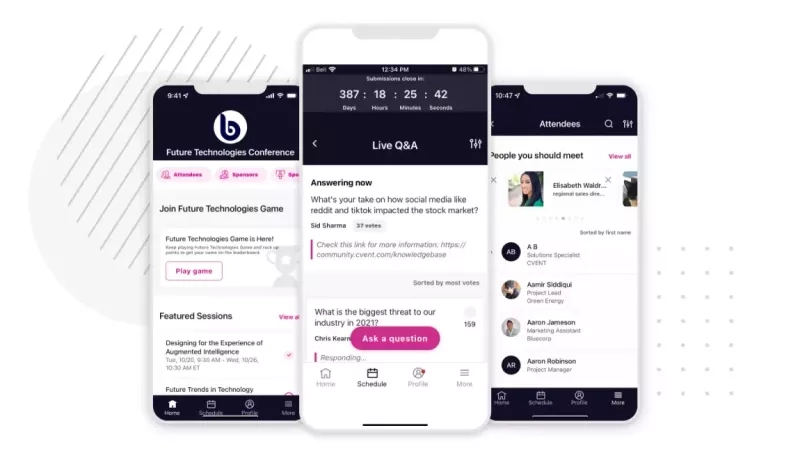
As traditional marketing channels become less prominent, embracing digital strategies has become imperative for staying relevant in a world where connectivity is paramount. Event digital marketing is no longer just about reaching a wider audience, however. You need to ensure that you’re reaching your intended audience through the most effective channels with the right content for every step of the process.
What Is Digital Event Marketing?
In its most basic form, digital event marketing is the use of online platforms and tools to engage the target audience, build anticipation, and drive attendance. But to get the most value from marketing in the digital sphere, you need to apply a strategic, tailored approach that utilizes a spectrum of techniques designed to effectively promote and enhance your event.
Why Is Digital Marketing Important for an Event?
Digital marketing is one of the best ways to inform and interact with your audience before, during, and after the event.
With online event marketing, you can:
- Create a dedicated event website that serves as a centralized hub for crucial information including schedules, FAQs, ticketing info, and other event details.
- Utilize social media to answer questions and build a buzz for the event.
- Use email marketing and other digital channels to follow up with attendees after the event and keep building relationships.
- Tailor your campaign to specific demographics, ensuring maximum relevance and impact.
- Make real-time adjustments based on campaign performance and pivot swiftly to optimize outcomes.
- Track and measure the success of the marketing campaign as well as the event, providing valuable data for future planning.
Done right, event digital marketing is a dynamic and versatile toolset that not only promotes the event but also engages the audience, builds brand credibility, and sets the stage for the success of future events.
Let’s explore the different digital marketing techniques you can use to promote your event and the most effective ways to utilize them.
Understanding Event Search Engine Optimization
Effective event SEO starts with thorough keyword research to identify relevant terms and phrases associated with your event. Tools such as Google Keyword Planner and Moz Keyword Explorer can provide ranking and search volume data on keywords you’ve chosen as well as alternative keywords to target. It’s better to prioritize long-tail keywords that reflect specific aspects of the event over short, generic terms such as “tech event.”
Fit these terms naturally throughout the event’s website and social media, making sure that the content is both high-quality and valuable so it can rank as high as possible in searches.
Google also prioritizes mobile-friendly websites in search results, so it’s important to ensure the event website is optimized for mobile devices to provide a seamless experience for users on smartphones and tablets.
Building high-quality, relevant external links to the event website from reputable sources is another important part of event SEO. Foster relationships with influencers, industry publications, speakers, event sponsors, and other event partners for potential link-building opportunities.
You should also conduct regular SEO audits to see what’s working and identify areas that need improvement. It’s also imperative to keep up with search engine algorithm changes and adjust your strategies accordingly.
Researching keywords, creating content, and climbing the search engine rankings takes time, so you should start well ahead of the event to reap the most benefits.
Creating a Custom Event Website
An intuitively designed and user-friendly event website serves as a central hub for information, registration, and updates. It provides a seamless experience for potential attendees, acting as a virtual venue where they can explore event details, speakers, and schedules and engage with interactive features. Here’s a rundown of the fundamentals of event website optimization.
Focus on Design
Users should be able to find the information they need quickly and intuitively within a compact but comprehensive website.
It’s important to utilize a mobile-responsive layout to make sure that users accessing the site on phones and tablets have the same experience as desktop users. Similarly, ensure the website is accessible to individuals with disabilities by incorporating features such as alt text for images and accessible navigation.
Incorporate compelling visuals as well, using high-quality images and graphics that represent the event branding and professional photography to showcase speakers, previous editions, and event-related activities.
Use prominent and strategically located call-to-action buttons to encourage registration, ticket purchase, and other desired actions. Compelling language such as "Register Now" or "Get Your Tickets" can help spur potential attendees to action.
You’ll also need to incorporate your SEO optimization strategy into the site’s meta tags, titles, and descriptions as well as integrate analytics tools to track website performance and user behavior. Refine your website and marketing strategies as needed.
Adding social media feeds and social sharing buttons to your website and mobile app will allow you to showcase real-time updates and encourage visitors to share event details with their networks.
And last but certainly not least, implement secure payment gateways for registration and ticket purchasing. It’s imperative that site users feel that their personal and financial information is safe so communicate the website's security measures clearly to reassure attendees about the protection of their information.
Curate Your Content
Your event website needs high-quality, relevant, engaging content that informs and motivates audiences. Everything from the web copy to the multimedia should communicate the benefits of attending the event and emphasize the unique selling points that set your event apart from others in the industry.
The event-specific content should include schedules, session details, speaker bios, maps, travel recommendations, and any additional info that helps attendees get to and navigate the event.
To build credibility and provide attendees with deeper insights, you can develop blog posts, speaker interviews, behind-the-scenes content, or a news section for updates and relevant industry happenings. Testimonials from past attendees, speakers, or sponsors, and highlights of notable successes or achievements from previous editions of the event can also build and sustain your event’s reputation.
Keep the website fresh by updating the content regularly leading up to the event and uploading session recordings, highlights, and other event materials and resources once it’s over.
Prioritize the User Experience
The main goal is to create a streamlined user experience that’s engaging and easy to navigate.
This means ensuring that essential event details such as date, time, venue, and agenda are prominently displayed on the homepage. You also need to streamline the event registration process with a user-friendly, intuitive form and provide clear instructions. Be sure to highlight any early bird discounts or exclusive offers to incentivize registration.
Including an FAQ section helps attendees with common concerns while a live chat option or an AI chatbot can provide attendees with immediate, real-time support and more personalized interactions. And incorporating interactive features such as polls, surveys, or quizzes can engage visitors while providing valuable feedback for event planners.
Offer a Virtual Event Experience
Whether it’s for those who can’t attend live or as a bonus for in-person attendees, a virtual event option alongside an in-person gathering is a good way to provide an inclusive and accessible experience. This hybrid approach acknowledges the diverse preferences and constraints of attendees and allows a broader audience to participate. By seamlessly integrating virtual elements, you can not only enhance reach but also create a more flexible and adaptable event.
Virtual event marketing doesn’t differ much from traditional event digital marketing, but be sure to highlight the convenience of attending from anywhere and the flexibility of on-demand content to encourage widespread participation.
Integrating Mobile Marketing
We already discussed optimizing the event website for mobile devices, but there are several other ways to leverage the power of mobile devices.
- Mobile App Development: Create a dedicated mobile event app that includes features such as schedules, interactive maps, and networking tools. You can also implement push notifications from the event app for real-time updates.
- SMS Marketing and Push Notifications: Utilize SMS marketing to send personalized event updates, reminders, and other notifications to attendees based on their preferences. Remember to respect privacy regulations and obtain consent for SMS communications.
- Mobile Ticketing and Payment Options: Allow attendees to store tickets digitally on their mobile devices for easy access and streamline the purchasing process for merchandise and concessions by providing mobile payment options for event purchases.
- QR Code Integration: Incorporate QR codes for easy access to event information as well as seamless check-ins, linking to promotional materials, or networking.
- Interactive Mobile Games: Develop interactive mobile games or challenges or create augmented reality experiences to offer immersive previews or interactive elements.
- Mobile Analytics: Implement mobile analytics tools to track app usage and engagement and better understand user behavior so you can improve future event planning strategies.
These mobile marketing options allow event organizers and marketers to enhance attendee experiences, drive engagement, and streamline various aspects of event participation.
Maximizing Pay-Per-Click ROI
For rapid and targeted exposure, Pay-Per-Click (PPC) marketing is an invaluable form of event advertising. Platforms like Google Ads and social media channels offer tailored advertising solutions that allow you to reach specific demographics and ensure the event is showcased to those actively seeking or likely to be interested in events like yours. Just make sure you set a realistic and flexible budget based on campaign goals and expected results.
You’ll maximize your advertising dollars by defining clear and measurable objectives for the PPC campaign – such as increasing event registrations, driving website traffic, or generating leads – as well as conducting thorough keyword research to identify relevant and high-performing keywords related to the event.
But even the best strategy and keywords won’t be effective without compelling ad content. You’ll need to craft concise copy and utilize images that highlight the unique selling points of the event and include a clear call-to-action (CTA) to encourage users to take the desired path.
Regularly monitor campaign performance metrics such as click-through rate (CTR), conversion rate, and cost-per-click (CPC) as well as key actions such as registrations, downloads, or purchases. Assess the campaign's return on investment (ROI) and adjust your budget allocation, bids, ad copy, and targeting parameters as needed.
Crafting Effective Event Emails
Event email marketing remains a potent tool for connecting with potential attendees. Crafting personalized and compelling email campaigns builds excitement, communicates updates, and encourages registrations.
This can be a data-heavy task, so using a full-featured email marketing platform will help simplify this process, but these are the basic steps:
- It starts with segmentation. Create email lists based on demographics, preferences, or past interactions. You can then send targeted and personalized messages to each segment for higher engagement. Don’t forget about past attendees, and consider offering an early bird discount or other incentives to previous participants.
- Next, you’ll need to develop concise and attention-grabbing subject lines that communicate the purpose of the email. Avoid spammy or vague language, and let readers know the value of the email upfront.
- The content of the email should also be engaging and visually appealing to encourage readers to take action. Topics like event highlights, speaker profiles, and exclusive offers coupled with images, infographics, or videos and prominent, clear CTAs such as “Register Today” or “Claim Your Discount” can generate greater interest and increase click-throughs.
- After the initial email, implement an automated drip campaign that sends a series of targeted emails consisting of timely reminders and exclusive offers at strategic intervals to maintain engagement.
Keep email marketing regulations such as GDPR and CAN-SPAM in mind and make sure you obtain consent and provide clear opt-out options.
Harnessing the Power of Social Media
The omnipresence of social media makes it a cornerstone of any digital marketing strategy. Platforms such as Facebook, Instagram, Twitter, and LinkedIn allow organizers and marketers to create a buzz, share engaging content, and foster a sense of community around the event. Live updates, behind-the-scenes glimpses, and user-generated content can all contribute to a dynamic online presence.
According to research from marketing experts at Community Brands, social media is the most popular form of event marketing with 55% preferring social media to attract event attendees. Even as early as 2018, research found that 30% of event marketers felt that social media was “very” or “extremely” effective in attracting attendees – and that number has surely risen in subsequent years.
The most important aspect of a social media event promotion plan is choosing the right platform. Professional and industry-related events, for example, will likely gain better traction on LinkedIn, while lifestyle events will likely do better on Instagram, Twitter, and Facebook.
Similarly, while visual content is valuable on every social media channel to capture attention and convey the event’s brand, you should prioritize high-quality images, graphics, and videos on visual-based platforms such as Instagram or Pinterest.
You’ll also need to create and promote unique event hashtags to bring attention to the event and facilitate easy tracking. Encourage attendees, sponsors, speakers, and influencers to use the hashtag in their posts to expand the event's reach.
Platforms such as Facebook Live, Instagram Live, or YouTube can also allow you to broadcast keynote speeches, sessions, interviews, behind-the-scenes moments, or other event content in real-time with live streams to engage remote audiences.
Another key aspect of social media event marketing is community building. By responding to comments, direct messages, and mentions promptly, you can foster meaningful connections, build a collection of engaged followers, encourage user-generated content, and enhance the overall experience for attendees.
As always, utilize social media analytics tools to track performance metrics, including reach, engagement, and follower growth as well as the effectiveness of different content types and posting strategies.
Sealing Event Digital Marketing Success
In the dynamic world of event promotion, embracing digital event marketing is not just a choice; it's a necessity. From creating an impactful online presence through a dedicated website and effective SEO to leveraging the targeted reach of PPC and the community-building potential of social media, the digital toolbox for event marketing is vast and powerful.
Putting it all together can be a challenge, but marketing management software can integrate these digital marketing techniques into a comprehensive and impactful promotional strategy that maximizes attendance and engagement. Likewise, a solid event marketing plan template can help you get started and organize your ideas.
By understanding and harnessing the diverse techniques available, your events can not only draw larger audiences but also create lasting impressions in the minds of attendees, ensuring the continued success and growth of events in the digital age.













